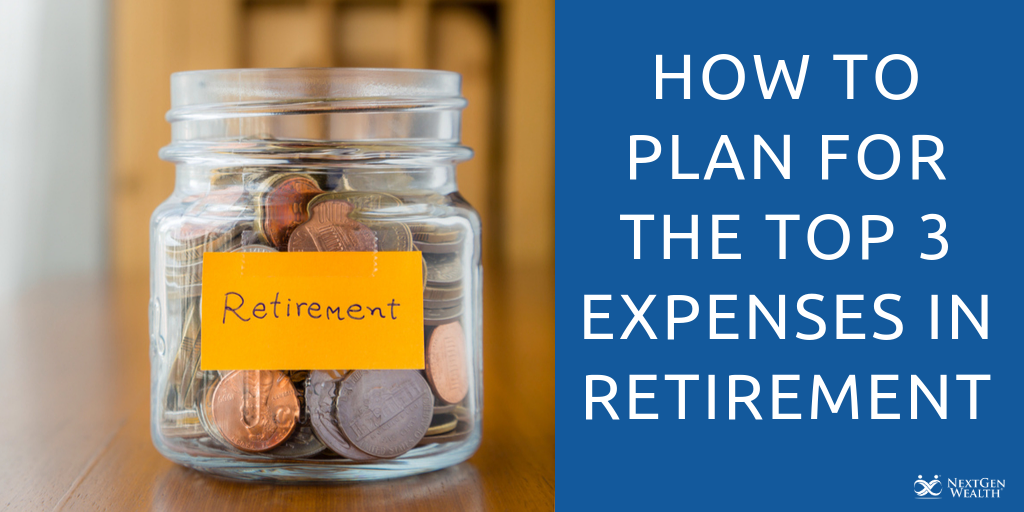How to Plan for the Top 3 Expenses in Retirement
No matter how old you are, it’s never too early to start planning for retirement. However, while there are many different elements to this process, it helps to break it down into a few core components. Today, we’re going to cover how to plan for the top three expenses in retirement. 
Making sure that you have enough money to last through your golden years is imperative. No one wants to run out before it’s time. However, it’s not just enough to worry about sources of income during your retirement. You also need to plan how you’re going to be spending that money.
So, with that in mind, let’s break down the top three expenses in retirement. For this article, we’ve decided to go with involuntary costs. For example, many retirees take advantage of this time to travel.
However, since you can always cut a trip short or not travel at all, this cost is entirely under your control. Instead, we want to focus on those expenses you’ll have to pay all the way through retirement.
Retirement Expense #1: Housing/Mortgage
No matter what, you’re going to need a place to live. Chances are that you already own a home (if not multiple). This means that a substantial chunk of your retirement income will go towards rent, utilities, and other maintenance costs (such as property taxes).
Here are a few ways to make sure that you’re stable enough in retirement to avoid letting these expenses derail your long-term plans.
Downsize to a Smaller Home
For the most part, retirees live a relatively solitary life. In many cases, it will just be you and your spouse. If traveling is a significant part of your retirement plan, you may not be home for much of the year anyway.
So, if you don’t have kids living with you, do you really need all that extra space? It’s tempting to remain in a home if you’ve been there for a long time, but consider all of the additional costs that could pile up. Also, keep in mind these other potential drawbacks.
Cleaning/Maintenance
As we get older, the idea of cleaning the house becomes more and more of a chore. Dusting, sweeping, vacuuming - all of these jobs will only get harder as your body ages. Not only that, but if you live in an area with significant weather patterns, you could also be looking at other chores like shoveling snow, draining water from a flooded basement, or cleaning out your gutters.
Obviously, you can hire other people to take care of all of these chores for you, but that’s just another expense to worry about in retirement. Is it worth the added costs just to stay in the same house?
Stairs
For most of your life, stairs are not a significant issue. However, as you get older, walking up and down flights of stairs will only get harder and more tiring. Not only that but what happens if you lose your balance and fall? Also, what will you do if you need to walk around with a cane or walker?
In some cases, you can install a motorized seat to carry you up and down to each floor, or you can build an elevator. Again, these are substantial costs that may or may not be worth the price point. Also, if you do plan on selling the house later, these elements might not be appealing for new buyers.
Property Taxes
One of the best reasons to downsize your home is so you don’t have to pay as much in property taxes each year. As you can imagine, paying for 3,000 square feet is a lot more than paying for 1,500. While your location can also influence tax amounts, the overall size of your living space can make a huge difference.
Pay Off Your Mortgage Quickly
If you have been living in the same house for decades, then you will be faced with a dilemma. On the one hand, you are probably close to paying off your mortgage, meaning that your monthly expenses will go down significantly. On the other hand, downsizing to a smaller home or condo might be appealing as you get older.
One thing to keep in mind, though, is that you can wait to downsize to a different place. However, paying off your mortgage is going to be beneficial no matter what you do. Not only will you eliminate a substantial expense, but you will have much more equity in your home if and when you do sell.
Also, consider whether you want to pass this property on to your children. If you own it outright, that process will be infinitely easier since your kids will only be responsible for property taxes.
So, if you’re already relatively close to paying off the mortgage (i.e., within five or six years), now is the time to start making bigger payments to get it done sooner. Just be sure that you don’t have any prepayment penalties for paying it off early.
Sublet/Get Roommates
Another option available to you in retirement is to take advantage of your larger living space and use it to earn some side income. For example, if you have a two-story house or a furnished basement, you might be able to find someone to rent a room (or multiple people).
For some, the idea of sharing the house with roommates may seem undesirable, but the rent payments can go a long way toward mitigating your retirement costs. Plus, if the mortgage is already paid off, you can use the money for other expenses, such as travel or property taxes.
Not only that, but you could consider having your kids or relatives live with you as well. You’ve already lived together for much of your life, so what’s the harm in doing so again?
Also, many millennials are moving back home anyway, due to a challenging housing and employment market, so you may already be in that situation. Charging your kids rent can benefit both parties, as it incentivizes them to stay gainfully employed, and it can help partially finance your retirement.
Retirement Expense #2: Healthcare/Long-Term Care
When talking about the top three expenses for retirement, you can’t avoid discussing your health. Getting older means that you’ll start to deal with problems you’ve never had before, such as brittle bones, aching joints, and susceptibility to disease.
No matter how healthy you are currently, old age is going to become an increasingly potent issue. So, you need to be sure that you’re prepared for it and everything else that comes along. Here are some considerations to think about when planning for retirement.
Medicare Costs
When you reach retirement age, you qualify for Medicare Part A, which doesn’t require a monthly premium. However, Parts B and D, which take care of things like prescriptions and medical diagnostics, do have monthly payments.
In addition to premiums, you also have to cover copays and deductibles. Not only that, but other health conditions, like vision and dental, are not covered by Medicare at all. As you get older, these costs will only get higher and higher.
Supplemental Health Insurance
As you age, certain body parts start to break down faster than others. Chances are that your eyes and ears will begin experiencing problems relatively early. Unfortunately, as we just mentioned, Medicare can’t help you in treating issues like hearing and vision loss.
So, assuming that you want to take care of every part of your body, you’ll need to get supplemental health insurance. Ideally, you’ll already have a good plan from your former employer. However, if that’s not the case, you’ll need to get individual insurance from a third-party provider.
If you already know that you have to go this route, now is the perfect time to get insured. If you wait until you’re older, you could be hit with higher premiums and deductibles since your body is older and less healthy.
When looking for a new insurance plan, keep these things in mind:
- Preventative Care - don’t wait until you’re sick to go to the doctor. Medicare offers free physicals once a year, so take advantage whenever possible. This way, you can spot potential health problems before they take over.
- Generic Prescriptions - you can save a lot of money by switching to generic medicine. In most cases, the active ingredients are the same, but they cost a lot less.
- Overseas Coverage - if you’re planning on traveling a lot, you want to be sure that your insurance will protect you when you’re out of the country.
Long-Term Care Insurance
For much of your retirement, you should be able to handle any health issue that arises. However, at a certain point, you’ll require extra assistance to do everyday tasks. Long-term care is a significant expense, and it can eat into your retirement income a lot faster than you may realize.
One way to mitigate these expenses is with long-term care insurance. However, the premiums for this kind of coverage can be expensive, which could negate the benefits. Another issue with long-term care insurance is that you have to get a plan before you need it. If you try to get a policy after the fact, you’ll be denied.
Overall, if you know that you’ll need additional assistance in the next few years, getting one of these plans may be worth it. Otherwise, do some further research before committing to anything.
Retirement Expense #3: Food/Lifestyle
So far, we’ve been talking about expenses that are mostly beyond your control. You don’t get to choose how much your mortgage payment will be, and you don’t get to decide if and when you’ll need to go to the doctor.
In this case, though, we’re going to be discussing your overall spending habits. When looking at the top three retirement expenses, food and lifestyle costs are mostly under your control, which means that you can decide how and when to spend your money. Let’s break down some of the various considerations you should make.
Eating Out
As a rule, if you buy groceries and cook at home, you’ll save a lot of money when compared to going out to eat. However, part of the appeal of retirement is that you now have the opportunity to experience things you couldn’t before. Whether it’s because you have more free time or fewer bills to pay, it’s tempting to splurge more regularly.
Realistically, though, you want to be strategic about when you eat out and how often. For example, if you’re planning on traveling a lot during your golden years, almost all of those meals will be at restaurants. So, instead of dining out at home, you can save that money for when you’re on your next trip.
Clothing/Accessories
By the time you retire, you should have amassed a pretty substantial clothing collection. However, because nothing lasts forever, you’ll still need to buy new clothes to replace old ones.
During retirement, now is the time to downsize not just your housing situation but your clutter as well. This is when you should take stock of what you have and see which items can be donated or resold. Consignment can be an excellent way to remove old clothes from your closet, while also pocketing some extra change.
Going Out/Nightlife
Now that you have more time on your hands, you can do all of the things you wanted to do before. However, in most cases, these outings will only add to your monthly expenses. Thus, you want to be a little more strategic about what you want to pay admission to do.
One alternative is to volunteer at various organizations. For example, local theater companies usually need volunteers to be ushers and ticket-takers. Best of all, you can see the shows for free.
Contact NextGen Wealth for Retirement Planning
We want to make sure that you know how to plan for the top three expenses in retirement (and more). Talk with one of our experienced financial advisors to see how you can make your money stretch further during your golden years. We want to see you have a successful and prosperous retirement!



